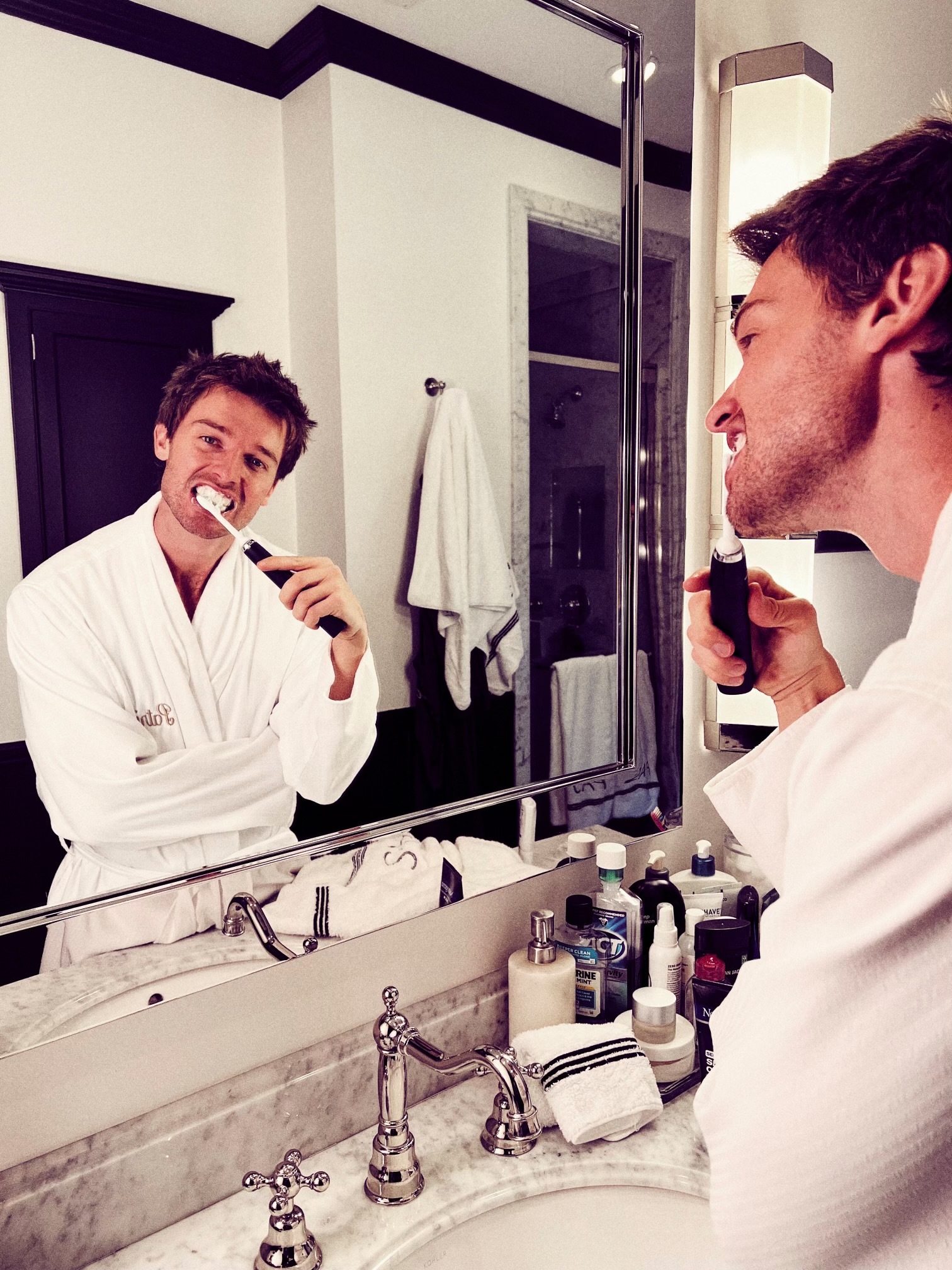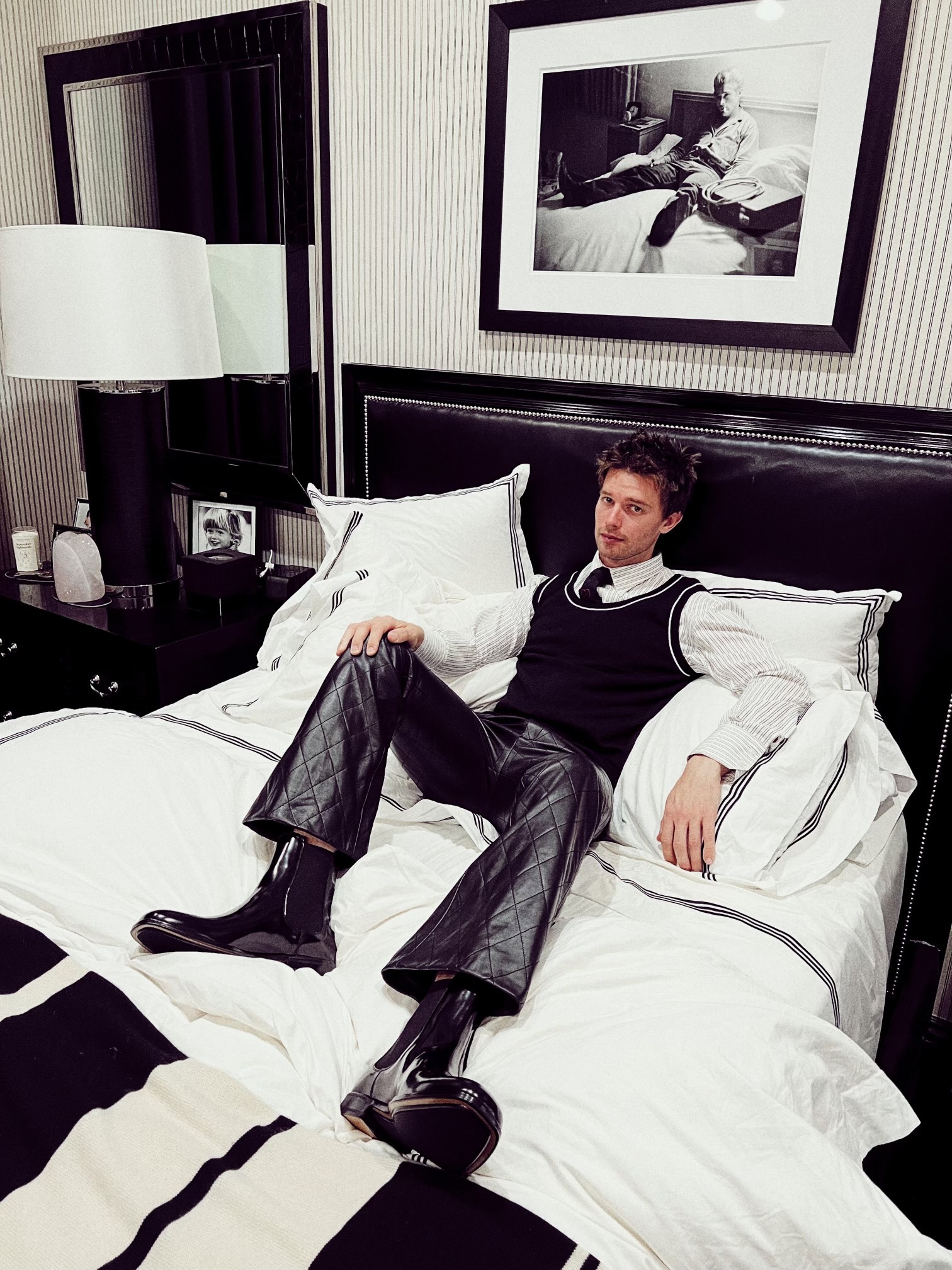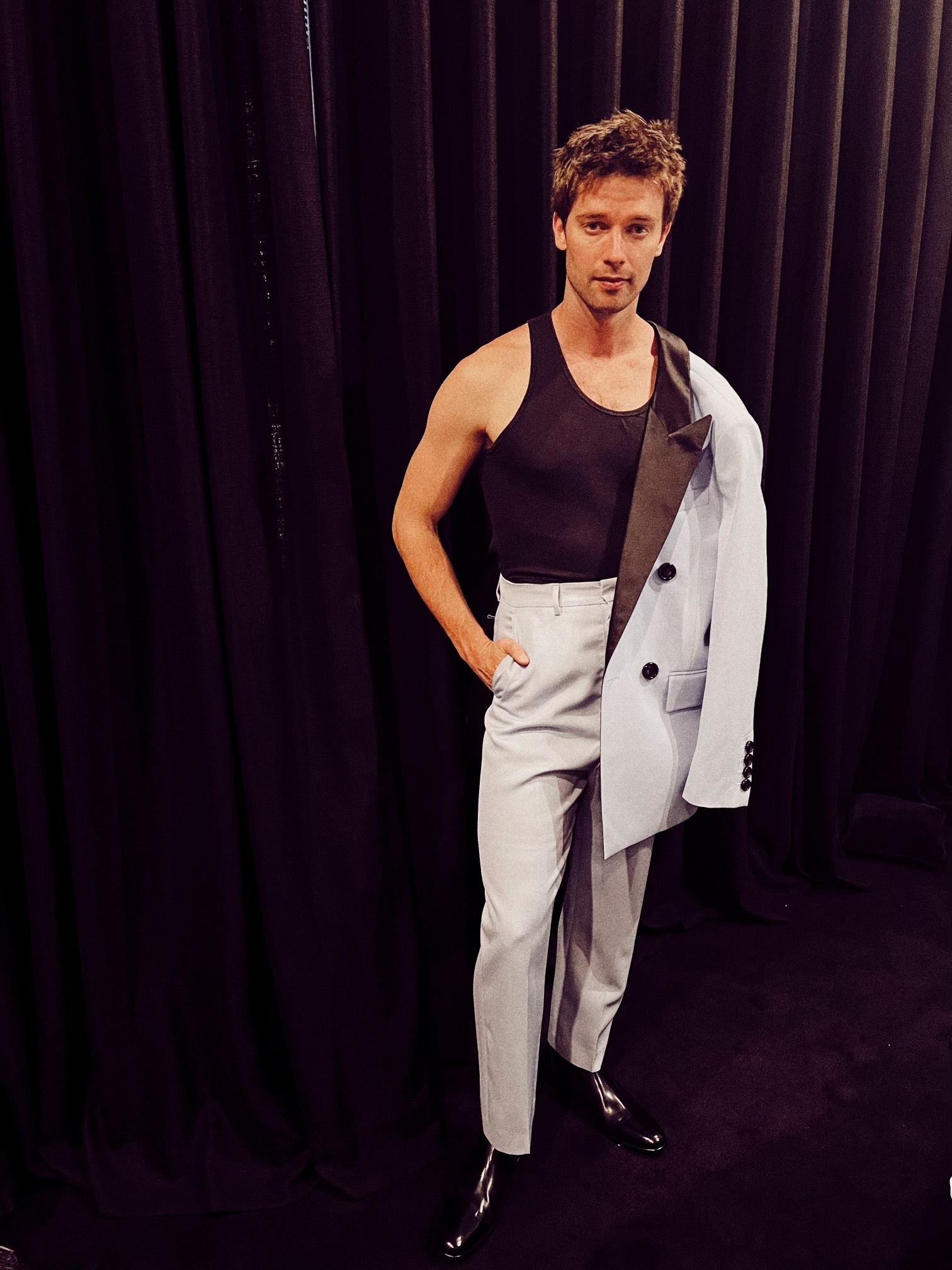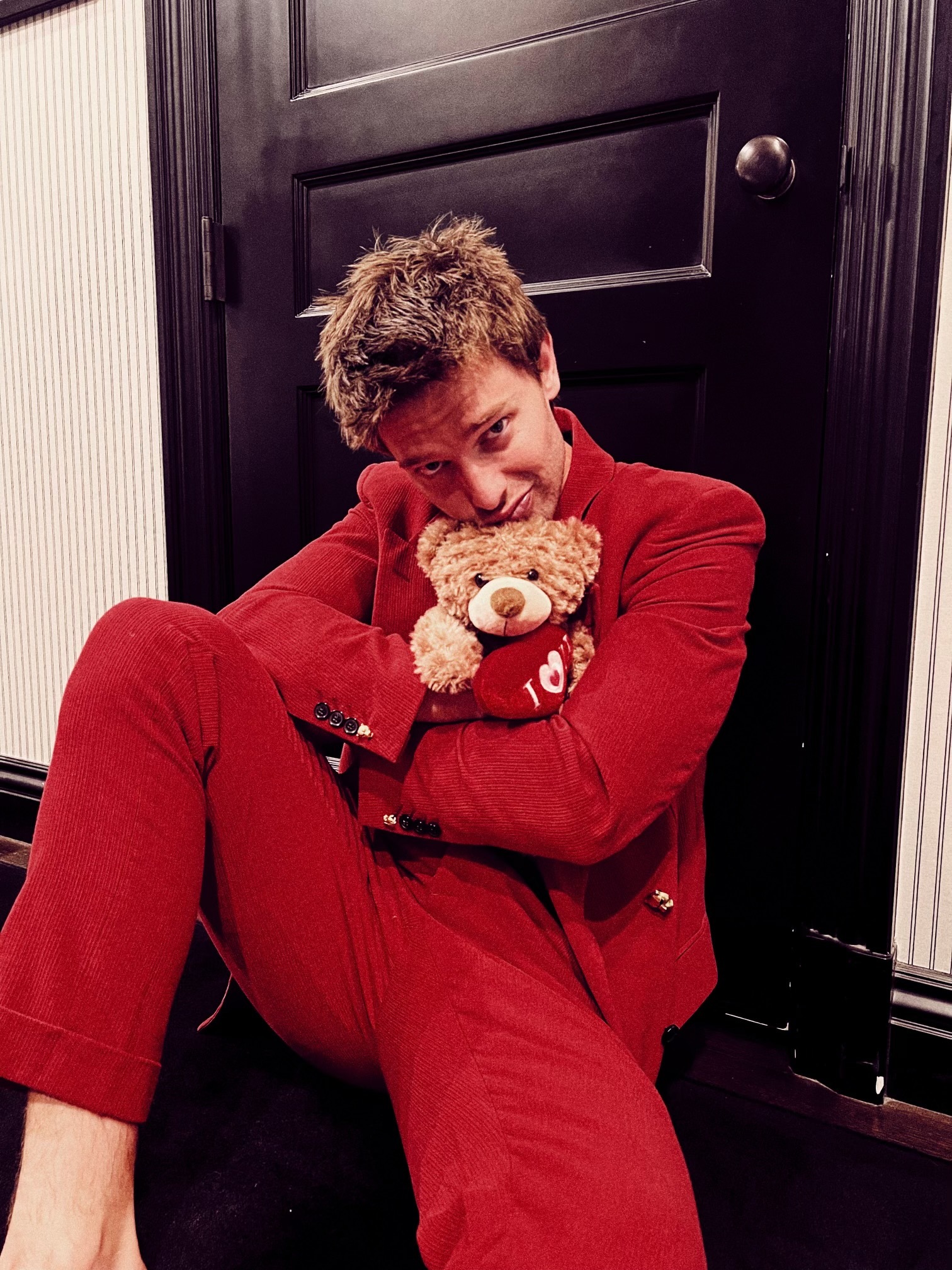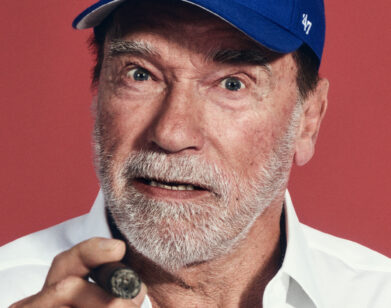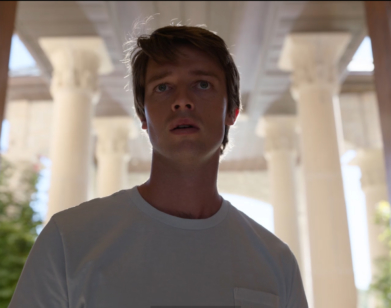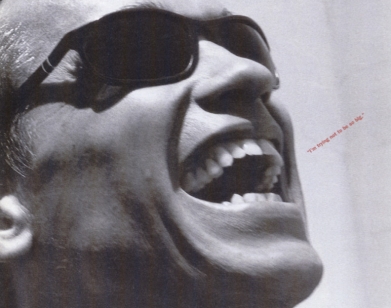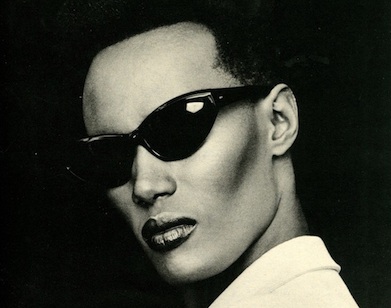IN CONVERSATION
Patrick Schwarzenegger Wants to Do It All
Growing up around some of the most famous movie sets in the world, it’s unsurprising that Patrick Schwarzenegger is about a decade deep into an acting career of his own. His latest role, as the son of a suspected killer in the HBO Max true crime thriller The Staircase, has the feel of a turning point for the 28-year-old, kicking off a string of meatier, high-profile roles in prestige-y projects like the upcoming spinoff to Amazon’s wildly popular superhero redux The Boys. But just like his dad, Schwarzenegger has his sights set on a world beyond hitting marks and memorizing lines. He recently connected with his Staircase costar Dane DeHaan to talk about all of it.
DANE DEHAAN: What’s up dude? How are you?
PATRICK SCHWARZENEGGER: I’m good! How about you?
DEHAAN: I’m hanging. So what are you doing in Toronto right now?
SCHWARZENEGGER: I’m filming the new The Boys spin-off. We’ll be here for the next couple of months and I’m super excited about it.
DEHAAN: Have you started working?
SCHWARZENEGGER: Yeah. I literally flew here on the night of our The Staircase premiere. I think I got home at 1:00, the car to the airport was at 3:00, and then I went right to work that day.
DEHAAN: How is the vibe on set compared to The Staircase set?
SCHWARZENEGGER: Well, I just started a week ago here, but it’s completely different. This is comedy and action, and there are these massive sets and green screens and blue screens, which I’ve never really dealt with. And with Staircase I arrived in Atlanta three weeks before we started filming, but I arrived here the day we started filming. So it was a little bit of just getting thrown into it.
DEHAAN: How do you feel about being in front of green screens and blue screens?
SCHWARZENEGGER: It’s definitely weird, just staring at the screen and the director is yelling different things happening and you’re just reacting and having to look around and build a fourth wall. It’s fun, it’s just something I’ve never done.
DEHAAN: In a lot of ways, it couldn’t be more different from what we’ve done on The Staircase, because everything we did with that was so hyperreal. Even the house set that we had, they went through painstaking detail to recreate the inside of the real house. But yeah, I’ve been through both kinds of scenarios and sometimes it’s crazy to think that it’s all the same job.
SCHWARZENEGGER: I’m in a weekly theater class that I’ve been in for a couple years now, but I messaged one of my partners in the class and was like, “I wish there was maybe something for the green screen.” It’s a whole other world.
DEHAAN: Did you play dress-up a lot when you were a kid?
SCHWARZENEGGER: Yeah, I did. When my dad was shooting Batman & Robin and he was Mr. Freeze, I had this Batman outfit with a cape and I would wear it to dinners and whenever we would go out. I would try to slide down the escalators, pretending I was Batman. Did you?
DEHAAN: Yeah, I loved playing dress-up as a kid. And I often feel like, even though I’ve gone to theater school, when you’re back in front of a green screen all that you can really tap into is that imagination you had when you were a kid. So what’s your theater class like?
SCHWARZENEGGER: Every week you get a play and you do maybe 10 to 15 pages, usually a scene. You get a partner and then you put it up every Thursday night in front of the class, 25 or 30 people. And then there’s a coach, so you go through different exercises, things to change. My last play was Burn This.
DEHAAN: Where did you go to college?
SCHWARZENEGGER: University of Southern California. I have a degree in business with an entrepreneurship focus and a cinematic arts minor in the business of film. I took theater classes as well there, but I’m not a major.
DEHAAN: What’s cinematic arts?
SCHWARZENEGGER: You would take a whole class only on Spielberg—watch every single Spielberg film and study everything from how it’s written to how it’s directed to why there were certain products in there and how that paid off the budget. There was a streaming class and you would learn about the rise of Netflix, what that meant, how it was affecting the box office. You would take a class where you would have to write a script, produce, direct, just to get you a little bit familiar with every angle of the industry.
DEHAAN: Wow. I think one of the things that has always impressed me about you is that you do understand that side of the business really well. And you’re an amazing entrepreneur. We would share a trailer and I’d hear you taking business phone calls.
SCHWARZENEGGER: Yeah, I was probably the worst person to share a trailer with.
DEHAAN: No, you weren’t at all! I’m such a singularly focused person—I feel like the only thing I know how to do and could make a living on is acting. But you’re really such an impressive business person. If you had to choose one, business or acting, what would you choose?
SCHWARZENEGGER: I’ve always had a love for business ever since I was little. My parents have photos of me running my lemonade stands, selling baseball cards out on the street, doing all of these different things to make money. And my dad was obsessed with teaching us about money and numbers. He was like, “Okay, this is how much each lemonade packet costs and you’re getting this much lemonade now, so how much do you need to sell it for to make your money back and then profit?” And in the mornings he would make us do these math equations to get our brains activated before we would go to school. Then I started to really get interested in film when I went to my dad’s sets and became mesmerized by the industry. But his advice to me was always, “Have another thing that you are really passionate about.” He said that the collegiate system and society really want to box you into becoming one thing. And the problem with the film industry is that even when you’re the biggest actor in the world, like he was at one point and was working eight months of the year, what are you doing the other four months? He found that a lot of his friends who were attempting to become actors were driven crazy by the amount of downtime. So he said, “If you’re going to go down this path, find something else that you really love and can work on.” Business was that thing. It’s what I focus on day-to-day when I’m not on set, which can be often. It keeps me sane.
DEHAAN: When you are filming and on set, do you ever get overwhelmed by having to run all these businesses?
SCHWARZENEGGER: I did get really overwhelmed during a period when we were filming The Staircase. It was the middle of September and we were launching MOSH, my mom’s and my new company—the protein bar that’s for the brain and gives back to Alzheimer’s research. We were also doing night shoots. Remember when we were in the courtroom? And I had to be up so early in the day to work with the manufacturers. I was literally running on two hours of sleep every night for that. So yeah, there are definitely times like that. Time management is key.
DEHAAN: I remember during The Staircase filming, you always talked about how you were obsessed with trying every consumer food product as part of research for your businesses. So you would go to stores and buy every single thing. Your fridge was so full!
SCHWARZENEGGER: Yeah, my girlfriend won’t go to the grocery store with me anymore because I could stay for hours. I think the people that work there know me on a first name basis. I love to ask them what’s new. Why did you guys start to carry this? What is different about it? I like to go to different stores and see how the pricing is different or where they place it. It’s a really weird thing that I just love.
DEHAAN: Can you draw any similarities between acting and being an entrepreneur or are they two completely separate things for you?
SCHWARZENEGGER: Well, there’s an element of creativity with both, right? But the most frustrating part of acting is that so much of your career is heavily dependent on other people, on someone believing in you and giving you the green light. If I think about how many auditions I went on last year, call it 50, and I got one of them, for The Staircase—those odds aren’t that great. You’re always waiting on someone else to think that you did the best audition or you have the physical look or you fit exactly what they need. Whereas in business, it’s really up to you, and the amount of work and time that you want to put in to get the results. So I enjoy that part more.
DEHAAN: Do you have a specific method of working in acting, things that you always do when you get a script? And how did you find that way of working? I know that I have very specific things that I have been taught how to do.
SCHWARZENEGGER: Well, from class they’ve taught us different ways. They always have us read it three times: once getting the overall story, a second time from your character’s point of view, and then once to understand the different themes throughout. And then there’s identifying the relationship between each character. Identifying the relationship you have to the different interiors or exteriors. Building the backstory. But there are also ways that I try to put myself in a different emotional state when reading something. I read it when I’m working out. I read it when I’m in the sauna. I read it before going to bed. I watched this video once on Matthew McConaughey and how anytime that he feels he’s going through an emotional change, he goes to the script and practices his lines. He tries to see if it changes his perspective or interpretation of what the character’s going through when he’s sad, when he’s drunk, when he’s smoking a cigarette, when he’s just hanging out, when he’s on his morning walk, when he’s feeling joyful, when he’s with his wife, when he’s with the kids, when the kids leave the house—all of these different moments. And ever since I saw that video, I’ve tried to incorporate that.
DEHAAN: That’s really cool.
SCHWARZENEGGER: How were you taught?
DEHAAN: I went to a classical training conservatory and the dean of our school, Gerald Freedman, was one of the original teachers at Juilliard, so it was all really classically based. But a lot of what you’re saying is what we were taught too. Although I’ve actually never heard of reading the script in different states and seeing how that affects you—I like that a lot.
SCHWARZENEGGER: Yeah, he’s a smart guy. But then the biggest thing is, how do you recreate that, you know? How do you put yourself back in that on the day?
DEHAAN: Sure. So, when I think about you, I think you’re someone who’s not afraid to do what makes you happy. And that’s a really beautiful thing about you as a person. Do you have any mottoes you try to live by that help you achieve that? How did you come to live a life where you can so unjudgementally seek your own happiness?
SCHWARZENEGGER: There was a period in my life that I definitely focused too much on what I thought other people wanted me to do and valued other people’s opinions more than myself. And then I think there was a point, probably after college, where I just realized that it was a bottomless hole always trying to do things for other people, trying to impress other people, trying to prove something to other people, and that the best course in life was to be me, and do what I wanted to do.
DEHAAN: How did you arrive at that realization?
SCHWARZENEGGER: I think it was a build-up over time. But, I mean, I used to be a pothead back in the day. Then, like six years ago, we were at Easter brunch and I was high. My dad said to me, “Why are you high?” And I was like, “I don’t know. It makes the brunch better. It’s fine.” And he just looked at me and goes, “You know, my biggest worry in life is that I wake up and everything was a dream. So why would I ever want to do anything that takes me out of my life and makes me something that I’m not?” He was like, “You’re healthy, you’re good-looking, you have a career, you have your family. Why do you ever want to drink or smoke or do things to take you out of your life?” And I haven’t smoked since that day. I rarely ever drink. I just mostly try to do me. Because I’m really fortunate—I have a great family that supports me, I have a great girlfriend, I have great friends. So, I try to just enjoy that.
DEHAAN: That’s beautiful. And what about your fashion? You’re not afraid to make some bold choices, I would say, right? You have fun with fashion. Is that something you’re passionate about?
SCHWARZENEGGER: I love fashion. I like switching things up and, yeah, I’m not afraid to wear things that are a little bit out-there. After the Met Gala, my dad sent me this—I have to pull it up. [Shows photo] He’s obsessed with Photoshop, so he sent me a photo of me from the Met, and he Photoshopped it with the guys from Dumb & Dumber. That’s all he said. He didn’t say anything about the outfit, just did that. [Laughs]
DEHAAN: [Laughs] He did that himself?
SCHWARZENEGGER: Yeah. He doesn’t have a phone, so he has an iPad and he just learns how to do things on there. But I always like wearing something that’s a little different. Of course, there are times that I’ll probably swing and miss, but I don’t really care. I’m not afraid to take a risk. I guess that’s the motto that I would say applies to most things in my life, from business to clothing to film or anything: I’m willing to risk it. You’re low-key fashionable too—I remember the first day you came to set with the Prada jacket and cool sports glasses.
DEHAAN: Yeah, fashion’s been a big part of my life. You know how they have the senior superlatives that you vote for in high school? I was voted best-dressed.
SCHWARZENEGGER: Me too!
DEHAAN: Nice man! Did you win any other ones?
SCHWARZENEGGER: Yeah. I got most likely to appear on Dancing with the Stars.
DEHAAN: [Laughs] Would you do that?
SCHWARZENEGGER: [Laughs] No, I don’t think so.
DEHAAN: That’s such an L.A. superlative. What do you think is the most valuable thing that you learned growing up in Los Angeles and Hollywood?
SCHWARZENEGGER: The importance of family, probably. My dad and mom were both working parents, but they prioritized family time. We were never allowed to miss family dinner during the week. Even on weekends, we could ask for permission to go out and friends could join family dinner, but every night at 7:00 we had family dinner and you could not miss the weekdays. And we always did our highs and lows, talking about what went well and what didn’t so that you knew what other family members were going through. The prioritization of family was something that we focused on more than pretty much 99.9% of other families that we knew.
DEHAAN: That’s pretty amazing that you did family dinner every night.
SCHWARZENEGGER: Yeah. My family was very not-Hollywood Hollywood, if that makes sense. They were very much in Hollywood, but not in the scene of Hollywood. My dad was very secluded, liked to live away, had his routine, had his friends that are all non-Hollywood people. It’s the same with my mom. Same with all of us.
DEHAAN: But you would go to school with Hollywood kids, right?
SCHWARZENEGGER: Yeah, there are a lot of things that are hard about L.A. and about Hollywood, and there are a lot of stories of it messing up kids’ lives, to say the least.
DEHAAN: Did you see that around you? Do you think that your family instilled such great values in you that that’s what helped you rise above it?
SCHWARZENEGGER: Yeah, it definitely helped me rise above it. I mean, I don’t want to paint my family too pretty. We had our screw-ups. But I know, without getting into names, plenty of people that are my parents’ friends’ kids in the industry that have gone down the other way and got caught up in the drug and alcohol space and the party scene. I think it was just that I couldn’t even imagine doing something and disappointing my dad and mom. We were also in the public eye a little bit differently because my dad was governor during my teenage years, so that was another heightened awareness. But yeah, I think it was the element of family and those values. And they were very open with us and we were with them. They wanted us to have a lot of dialogue and be very comfortable with each other.
DEHAAN: Do you think maybe that’s one of the things that made you excited about The Staircase? Because it’s so much about family, about relationships. And the family is so complicated.
SCHWARZENEGGER: Yeah, there are definitely parts of it that spoke to me. Even with my character Todd and [his father] Michael’s relationship—you always want your dad’s approval, and that’s like Todd’s North Star, making sure that Michael knows he’s there by his side through thick and thin, making him proud. So there are definitely elements of that that I have with my dad. Michael was also a prominent writer, and having that pressure that Todd probably had with his dad, living up to that name and reputation, was something that I could tap into, because that’s something that I have. So, yeah, there were things about the family and about the story.
DEHAAN: I saw your dad’s Instagram post about you the other day that he reposted. So I can tell that he is in fact very, very proud of you.
SCHWARZENEGGER: [Laughs] That was a funny thing to just repost. I was like, “You used “repost”? I didn’t even know that “repost” is still there!”

